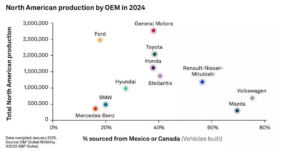Fiat and Chrysler strike alliance amid crisis
By Gilles Castonguay and Poornima Gupta
MILAN/DETROIT (Reuters) – Italy’s Fiat said on Tuesday it would be given a 35 percent stake in struggling U.S. automaker Chrysler LLC in exchange for access to technology and overseas markets in a deal underscoring the huge stress on the global auto industry.
Under the terms of the deal, Fiat would not pay cash for its stake in Chrysler, which has already been given $4 billion in emergency funding from the U.S. government.
Instead, Fiat would provide the U.S. automaker with access to fuel-efficient vehicle platforms and components and to sales outside the United States where Chrysler is largely absent.
Analysts said the deal could provide Fiat with sales to ride out the industry crisis and could move Chrysler’s majority owner Cerberus Capital Management closer to an exit strategy for a failed investment.
But they questioned how the deal, which must be approved by the U.S. government, would shore up Chrysler’s financial performance at a time when it and rivals are all burning cash.
Chrysler’s sales tumbled 30 percent in 2008 and it ended the year with only $2 billion in cash and reliant on a government bailout to keep it afloat.
“When you look at the situation with the erosion of the sales and revenue at Chrysler, the most immediate need I would think is cash replenishment. I don’t see any immediate relief for Chrysler,” said Dennis Virag, president of the Automotive Consulting Group.
The United Auto Workers, which faces pressure to make new concessions under the bailout for Chrysler and larger rival General Motors Corp, offered its support for the Fiat deal, saying it could preserve U.S. factory jobs.
Chrysler, which owns the Jeep, Dodge and Chrysler brands, is 80.1 percent owned by Cerberus, which paid $7.4 billion for its stake in 2007. The rest is held by its former parent, Germany’s Daimler.
Daimler has written down the value of its remaining 19.9 percent stake in Chrysler to zero.
Fiat said it could raise its stake beyond the initial 35 percent. That step would depend on the success of Chrysler’s restructuring, a person familiar with the matter said.
“It’s a good deal,” said Fiat Vice Chairman John Elkann. “We have already said it’s important to have consolidation in the auto sector.”
Fiat shares rose almost 4.5 percent on the deal.
CHEAP TICKET TO THE UNITED STATES
Analysts said the outlined deal looked mostly positive for Fiat because they saw it as a cheap way for it to enter the U.S. market — still the world’s largest despite a recent sales slide.
Chrysler, now the fourth-largest automaker in the U.S. market as measured in sales, has been slashing costs and jobs for the past year as it looked for a larger partner.
Under its U.S. government rescue, Chrysler must demonstrate by the end of March that it can be viable, and the automaker said the proposed Fiat deal would move it toward that goal.
Fiat said it would aid Chrysler in putting together its turnaround plan for U.S. officials ahead of an initial February 17 deadline.
Chrysler also said it would be given access to all of Fiat’s vehicle platforms, except the Ferrari sports car line.
JP Morgan analyst Himanshu Patel said the deal appeared to have “minimal downside” for both Fiat and Chrysler and could help the U.S. automaker secure another round of bailout funds.
“While Fiat will not provide a cash equity injection, its willingness to dance with Chrysler may provide Washington just enough cover to lend Chrysler additional funds,” Patel said in a note for clients.
But Patel said Chrysler could still face the risk of failure down the road if the U.S. market fails to recover.
Analysts said many aspects of the proposed deal remained unclear, including how Fiat cars would be sold in the United States and how much cost savings the deal could bring.
“This is a strategic alliance,” said Tim Ghriskey, chief investment officer with Solaris Asset Management in New York. “It certainly doesn’t hurt and it might help, but it does seem like a Band-Aid when there’s a large wound.”
(Additional reporting by Michael Shields in Frankfurt and Ben Klayman in Chicago; Editing by Mike Nesbit, Elaine Hardcastle and Matthew Lewis)








